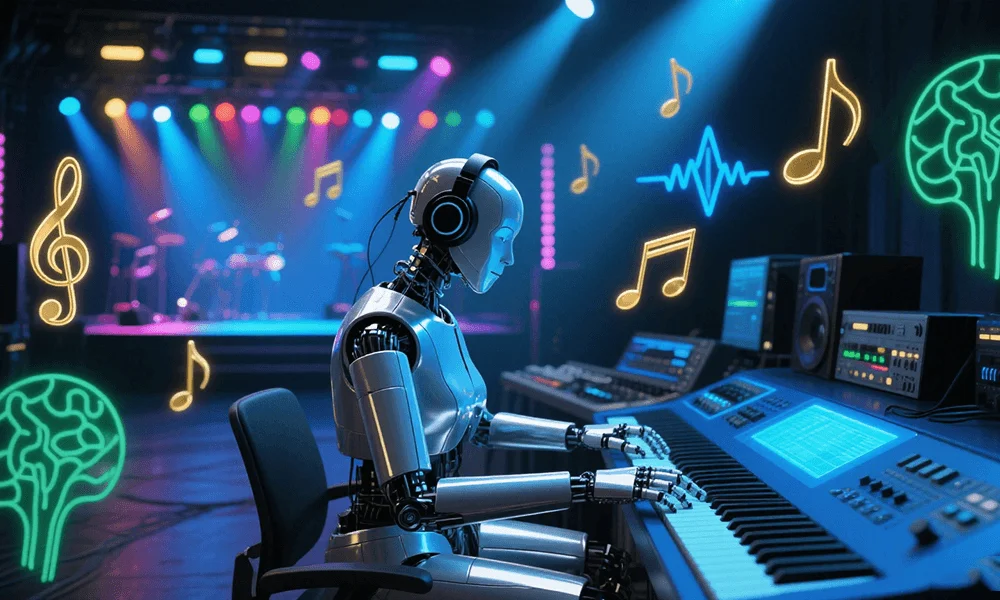
What Is AI Generated Music? A Complete Guide to AI Music Tools and Trends
Updated at: 2025-08-12 10:46:22
What is AI generated music, and why is it sparking both excitement and controversy in today’s creative world? AI-generated music refers to music compositions—melodies, harmonies, rhythms, vocals—created autonomously by machine learning models such as Transformers, GANs, and LSTMs. Once the domain of researchers, these tools are now accessible to anyone with a few clicks, raising important questions about creativity, copyright, and the future of the music industry.
This article explores the essence of what is AI generated music, how it works, its applications, benefits, legal challenges, and future trajectories—all while keeping things engaging, educational, and accessible.
What Is AI Generated Music?
Definition & Essence
AI-generated music is music composed entirely by artificial intelligence models—with minimal to no human intervention. Users typically input text prompts, genre preferences, or example clips, and the AI generates fully orchestrated songs. This is fundamentally different from AI-assisted music, where AI tools support human musicians rather than creating entire pieces independently.
A Brief History
- Rule-based systems & MIDI: Early computer composition relied on preset rules and MIDI data.
- Neural networks: LSTM and CNN models began generating coherent short melodies.
- Modern AI models: Advanced architectures like Generative Adversarial Networks (GANs) and Transformers now enable sophisticated, stylistically rich song generation.
How Is AI Generated Music Created?
Core Algorithms & Model Architectures
- Transformers (used by models such as MusicLM and MusicGen) excel at understanding long-range dependencies and musical structures.
- GANs are typically used to produce realistic textures—especially in rhythmic and percussive layers.
- LSTM/CNN architectures, though older, are adept at modeling temporal patterns in short compositions.
Training Data & Copyright Issues
These models train on massive datasets—MIDI files, public domain audio, and copyrighted tracks. Legal cases have emerged, particularly against platforms like Suno and Udio, accused of training AI on copyrighted music without permission. Major labels (Universal, Sony, Warner) and the RIAA allege infringement and seek damages up to $150,000 per song. Country artist Tony Justice has brought a class-action suit, arguing AI copies artists' original work.
Applications of AI Generated Music
Content & Commercial Use
AI music is widely used to instantly generate background tracks for ads, videos, and games—enabling faster production at reduced cost.
Education & DIY Composition
For budding composers and students, AI offers instant feedback, inspiration, and simplified composition tools that aid learning without being overwhelming.
Virtual Artists & Streaming Platforms
AI-created “artists” like The Velvet Sundown have amassed hundreds of thousands of listeners on Spotify. Their tracks, along with hyper-realistic band images, are engaging millions—despite having no real members. Spotify has no policy labeling AI-generated music, while Deezer flags 18% of uploads as AI, with 70% deemed suspicious.
Benefits of AI Generated Music & Emerging Opportunities
Efficiency & Cost Savings
AI can compose dozens of tracks in minutes, reducing the time and budget required compared to traditional music production.
Creative Expansion & Democratization
Independent artists gain affordable and creative access to music production. AI can amplify human creativity rather than replace it.
Market Growth & Investment
The AI music industry is rapidly expanding, projected to grow from hundreds of millions to nearly $4 billion by 2033, with over 20% annual growth.
Legal Challenges in AI Generated Music
Copyright Infringement & Litigation
Major lawsuits have been filed by Universal, Sony, and Warner (via the RIAA) against AI platforms like Suno and Udio for unauthorized use of copyrighted material. Tony Justice’s class-action lawsuit contends AI firms "elected to simply steal the songs" rather than licensing them.
Ethical & Originality Concerns
Critics argue AI compositions are emotionally flat and lack soul. Artists like Imogen Heap and Elton John have demanded transparency and ethical training protocols.
Impact on Creators’ Revenue
Experts warn that artists may lose around 25% of income due to AI’s cost-effective mass production, potentially saturating the market.
Regulating AI Generated Music & Collaboration Trends
Industry & Institutional Responses
Recording Academy CEO Harvey Mason Jr. supports legislation like the No Fakes Act, advocating for AI as a tool, not a replacement.
AI-Music Detection Methods
Research indicates detection tools can identify AI-generated music with 99.8% accuracy. These tools may be integrated into streaming platforms and content ID systems.
Licensing Talks & Transparency Tech
Universal, Sony, and Warner are in talks with Suno and Udio to institute licensing, artist opt-outs, and fingerprint-based attribution—potentially changing the game.
Future of AI Generated Music: Trends & Predictions
Human-AI Co-Creation
AI is expected to become a standard “assistant” in studios, composing with humans to refine and perfect ideas collaboratively.
Personalized & Emotion-Aware Music
Next-gen AI might craft custom soundtracks based on mood, fitness, learning, or meditation, offering tailored musical experiences.
Regulatory Frameworks & Labeling Standards
Countries like the U.S., EU, and U.K. are moving toward mandatory labeling of AI-generated content to ensure transparency and protect human creators.
How to Start Making AI Generated Music
Recommended Entry-Level Platforms
- Suno (launched v4.5 in May 2025): Text-to-music AI integrated with Microsoft Copilot.
- Udio (beta since April 2024): Offers vocal and instrumental generation, praised for its emotional depth.
Best Practices & Risk Management
- Craft clear text prompts and iterate
- Use AI-generated tracks as drafts or inspiration, not finished products
- Prioritize platforms that disclose training data sources or offer licensing options
- Obtain appropriate permissions for any commercial release
Conclusion
What is AI generated music? It’s an emerging form of creativity where machine learning models autonomously generate music, reshaping the way songs are made, distributed, and enjoyed. While its efficiency, scalability, and democratization are undeniable, the industry must address copyright, authenticity, economic, and ethical concerns. Ongoing efforts in detection technology, regulatory policy, and licensing frameworks aim to balance innovation and fair compensation.
AI is not here to replace real artists—instead, it’s poised to become a powerful creative partner. If you’re curious, try generating a song on Suno or Udio—but always do so ethically, with awareness of copyright, labeling, and support for human creators.
